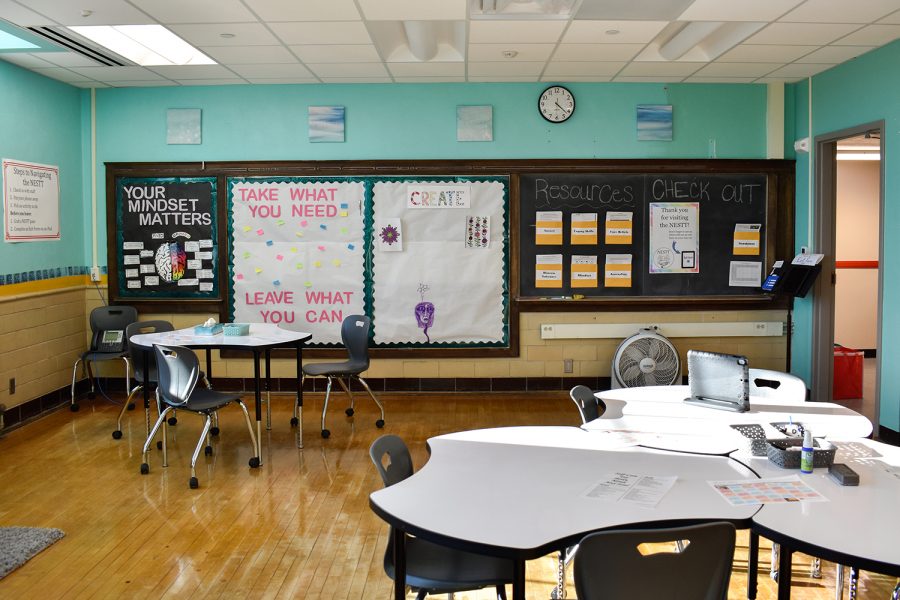Iowa City High School opens NESTT mental health center
City High’s year-in-the-making mental health center opened in room 3110 on Jan. 8, providing a space for students to detangle distressing emotions and gain access to additional mental health resources.
March 14, 2021
Tucked away on the third floor of Iowa City High School is an old classroom occupied by tables where students sit to color, journal, and play with fidget toys or kinetic sand. Unlike the building’s other classrooms, the space also allows students to decompress with yoga exercises, relax in a beanbag chair, or make a cup of tea.
This space is in room 3110 and functions as City High’s recently developed mental health center, NESTT, which stands for Navigating Emotions and Stress Through Training.
Amy Kahle, a student and family advocate at City High, said NESTT opened on Jan. 8, with funding from a grant from the Iowa City Community School District Foundation, because of growing concern about a lack of mental health spaces for students in the Iowa City Community School District.
“We had been noticing that health has become a bigger and bigger barrier for students,” Kahle said. “We were trying to figure out a centralized location where — if a student was having some kind of big emotion and they needed a safe place to go — that there would be one centralized place.”
The NESTT center is staffed by interns training in social work, Kahle added.
Katie Vodraska, a NESTT intern and social-work master’s student at St. Ambrose University, said she helps students visiting NESTT develop a coping-skill toolkit.
“We try to always offer some sort of therapeutic-based skill, whether it’s based in cognitive behavioral therapy or mindfulness,” Vodraska said. “With all that in mind, we try being trauma-sensitive and understand that with the students who are visiting us, life didn’t stop happening when they get into the school doors, and what happens while they’re here goes home with them too.”
Krystyna Kaminski, also a social-work master’s student at St. Ambrose and NESTT intern, said that, although NESTT’s goal is to help students develop healthy coping strategies to combat challenging emotions, the mental health center is not a therapy office.
“We center a lot of the skills we teach around a combination of cognitive-behavioral therapy and mindfulness, but we’re not giving them actual therapy, and students know that,” Kaminski said. “We have a school-based therapist that works through Four Oaks, so sometimes we would refer students to her.”
Since NESTT’s January opening, Kahle said the mental health center has engaged in over 300 student interactions. Although the program has been successful so far, she said its outreach activities are limited by COVID-19.
“I think we’re still in our infancy because of COVID-19 and because it took us a little bit more time to open up, but I’ve already seen some ways that NESTT has been a game-changer for students,” Kahle said. “We’d love to have some support groups and some specific activities after school, and we just can’t do that right now because of COVID-19.”
While NESTT addresses various emotional concerns, COVID-19 anxiety is a common reason that students visit NESTT, Kaminiski said.
“I think with some of the kids that come in with high anxiety – some of it does stem from COVID-19,” she said. “The whole situation with the pandemic has brought students anxiety about either the actual virus or the fact that they’re not having as much social connection with their friends.”
Even though visiting the in-person NESTT location is usually a student’s preferred space for seeking mental health resources, Vodraska said NESTT offers Zoom sessions.
“It looks pretty similar over Zoom — we’re having similar conversations. We just don’t have the physical things like the coloring books or the fidget toys,” she said. “We are usually asking them what would be helpful today and limiting it to like 15 minutes while using mindfulness, practicing breathing, and working through anxious thoughts or a low mood.”
While accommodating students over Zoom, Kaminski said NESTT is also in the process of improving outreach to LGBT students by providing resources specific to the population’s challenges.
Looking at the bigger picture, Vodraska said she thinks City High’s NESTT helps set a district and statewide precedent of incorporating mental health centers in schools.
“I would say that my dream would be that every school would have a NESTT space. As a social worker, I hope that every kid will get this type of support, and we’ve seen that kids are thriving with this kind of [resource],” Vodraska said. “Students are saying, ‘We always wish we had something like this.'”





